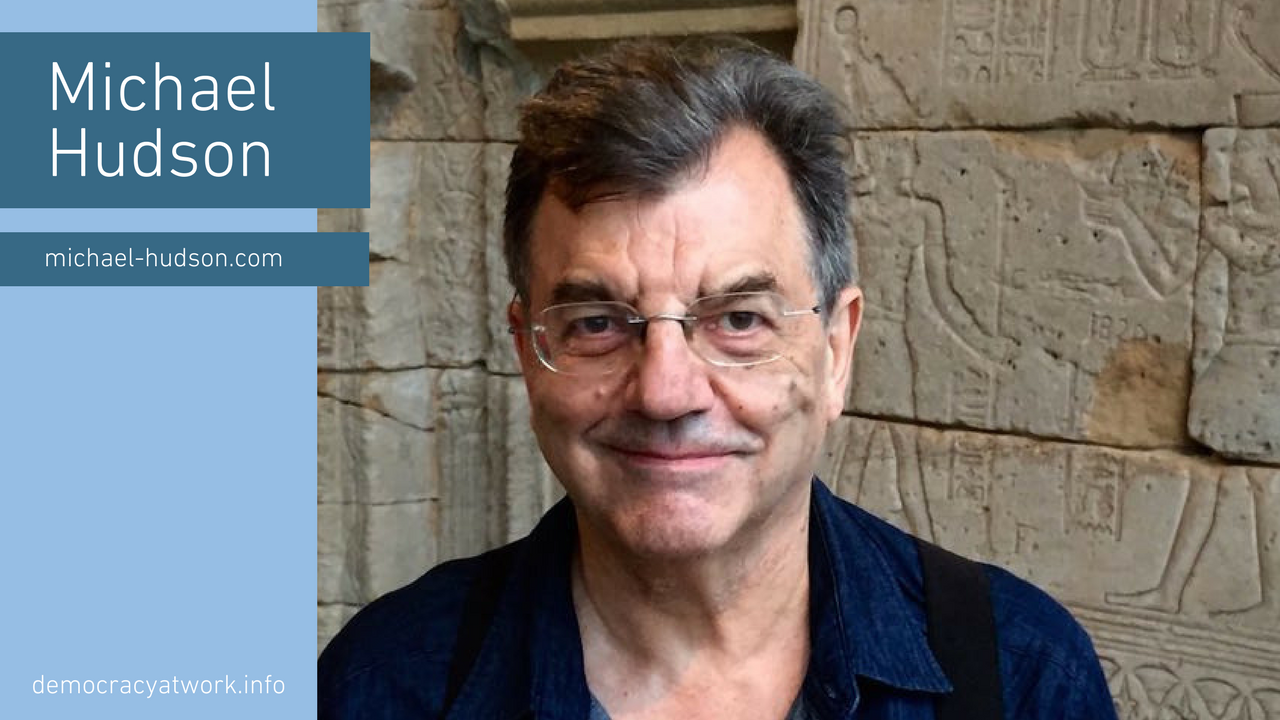
Webinar with professor Hudson: financialization is suffocating the economy
More and more economists state that we have created a “financialised” economy where it pays more to passively own than to work, to run companies or in general to do things that benefits society. The financiers are becoming increasingly powerful and richer, while households, business owners and society must tighten their belts. Why do we accept this?
Welcome to an exciting webinar with professor Michael Hudson. He will show how economic and historical myths about money, debt and value have been used to justify an economic system that benefits financiers at the expense of everyone else. This webinar occured Thursday 27th May.
Here is a link to a recording and a transcript of the webinar.
Financialization is stifling the real economy
How, and by what, is value created? One group of economists who studied this in depth were the classical economists: Adam Smith, John Stuart Mill, Karl Marx and others. They wanted to free society from the brutal legacy of feudalism and they therefore developed a number of important concepts and theories we can still learn from, according to Michael Hudson.
In today’s neoclassical economic theories terms such as “free markets” are misinterpreted, he says. In today’s economy there is no “free market” – rather the financial sector dominates, which impoverishes countries and populations by indebting them. It makes money and power flow upwards. According to Hudson, we have a neo-feudal system, where public interest is sacrificed for the interests of the financial sector.
Today’s systems and policies support the financial sector to live on “unearned income”, to passively make money on ownership and indebtedness, instead of working and contributing to the development of society.
Financialisation has also taken place at the expense of industrial capitalism, undermined the power of a functioning, independent state and thus eroded democracy. Is Hudson right? Form your own opinion – come to the webinar where he talks about economics according to the classical economists and compare with today’s neoclassical theories.
Myths from finaciers has shaped our worldview

Why do we have an economy and politics that push for the financialization of society at the expense of the vast majority?
Michael Hudson showed in our previous webinar how the most wealthy for thousands of years have used debt to conquer property and power; how they have written the rules so that these will benefit themselves, and that they have tried to capture historiography.
Economists’ disregard for debt as an instrument of exploitation even prompted Hudson to undertake his own research about how debt had been handled historically. He found out that:
- Money was invented as a tool for the ruler/government to organize and develop society so important chores were done.
- This was done through double-sided accounting, where credits and liabilities were noted, to know who was owed what.
- Weather, war or anything else could make the debts impossible to pay. Debt relief was then used to save the population from debt slavery and to safeguard an efficient economy.
These conclusions are diametrically opposed to what is taught today:
- That money arose spontaneously to facilitate barter.
- That money is a commodity (e.g. gold).
- That the economy would fail if debts were written off.
This raises questions about the state. What role should the state play in a system based on a correct history of money and debt? What would society look like if we in politics used what the classical economists say about free markets, and how (and by what) value is created?
Come and listen and learn more about how historical myths shape our worldview and today’s politics. Together, we can make the money system democratic and for the benefit of all. Knowledge is power.

About professor Michael Hudson
It takes courage to dare to stand up for the right when it goes against established beliefs. To be listened to and respected also requires great experience with deep knowledge. Hudson has acquired this and it has led to him being an adviser to governments in United States, China and Russia. He warned and was right about the debt crisis in Latin America in the 80’s and the debt crisis in 2008
In addition to his contributions to history research, Hudson is unusually deeply and broadly rooted in the realities and political circumstances of the economy. He has worked on Wall Street with David Rockefeller, CEO of Chase Manhattan. He has also acted internationally as an advisor to governments on issues concerning financial and real estate markets, as well as various industries (such as oil).
During his time at the United Nations Educational, Scientific and Cultural Institute (UNITAR), Hudson warned that Latin American countries would not be able to pay their debts in US dollars. He was right.
Historic chance
The door is open for 20 months
In Sweden we have a unique opening right now. Our parliament has initiated an inquiry into the state’s role in the monetary system December 11, 2020.
Thus, an otherwise neglected subject is now on the political agenda: how money is created and allocated by its creators.The door is open for 20 months. Within this time-frame we are determined to create a new monetary paradigm in Sweden.
To continue our rapid expansion, we need your help. Please invite your friends, spread the word, and help us keep momentum up, with more seminars, campaigns and activities.
Never doubt that a small group of thoughtful, committed, citizens can change the world. Indeed, it is the only thing that ever has.

Where, when and how?
– Tuesday, May 27e, at 7 p.m. CET
– Digital meeting at Zoom
– Link to attend will be sent to your email
Positiva Pengar is a Swedish non-profit association, focusing on a crucial question of our time: how money is created and destroyed and the consequences on society and our lives.
We are independent from all political parties. Our vision is a democratic monetary system that is used for the benefit of society and citizens.
